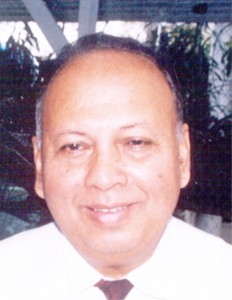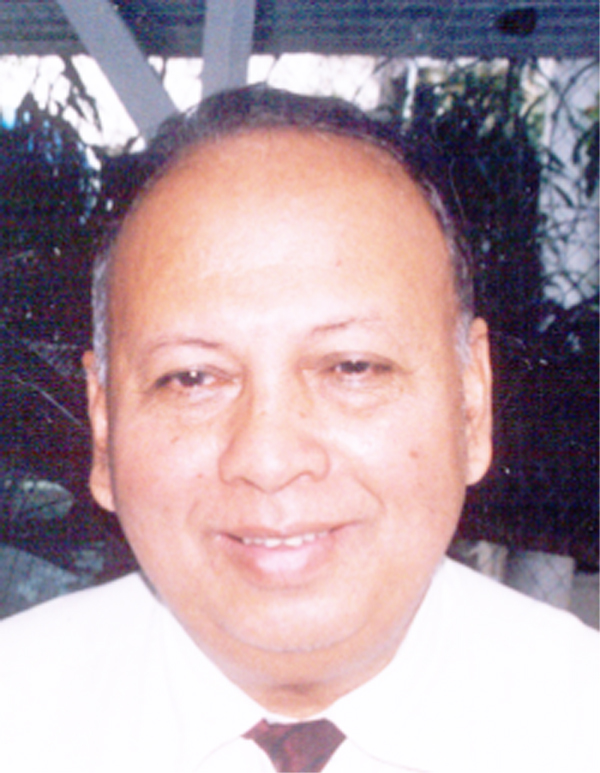Mohamed Bacchus, October 3, 1940 − April 9, 2009
Dr Mohamed Yousouf Bacchus, FRCOG, former chairman of the Medical Council of Guyana, died on April 9, 2009, aged 68.
 Dr Mohamed Yousouf Bacchus was a prominent obstetrician and gynaecologist and an advocate for reproductive health, family planning and responsible parenthood. He contributed to laying the groundwork for caesium cancer treatment and dialysis centres which the country needed badly.
Dr Mohamed Yousouf Bacchus was a prominent obstetrician and gynaecologist and an advocate for reproductive health, family planning and responsible parenthood. He contributed to laying the groundwork for caesium cancer treatment and dialysis centres which the country needed badly.
Although he was known for his unflappable comportment, Dr Bacchus’s four-year tenure of the chairmanship of the Medical Council of Guyana was far from tranquil. He wielded the authority of the office like a sharp, surgical instrument to excise the grossest malpractices and to ensure the well-being of patients. In so doing, he effectively expressed the essence of the divergence between the professional approaches and the political attitudes to health. According to one colleague, he “brought a period of calm to the medical community where, with his reasoned, disciplined approach, he was able to deal with many thorny issues that plagued the medical fraternity.”
One such thorny issue was the official attitude to complaints against medical practitioners. In one exceptional case in Berbice which resulted in the death of a patient, the council under Bacchus’s robust chairmanship found the practitioner guilty of professional malpractice after investigating the matter. To the relief of many, it ruled that the doctor’s name be erased from the register of medical practitioners in accordance with the Medical Practitioners’ Act – a reassuring, though relatively rare and severe reproof, which sent a strong signal to other doctors and aggrieved patients.
Another area of neglect was officialdom’s nonchalant approach to foreign medical doctors who visited the country from time to time to do short-term charitable medical work. Bacchus complained strongly that the well-meaning visitors were not being required to comply with the legislation governing the practice of medicine. He asserted that the Medical Practitioners’ Act provided for the registration of doctors who wished to render voluntary service and insisted that, to protect Guyanese citizens, the law must not be flouted.
There were many other obvious deficiencies in the availability of basic medical services to the public. As chairman of the Central Islamic Organisation of Guyana’s Medical Committee, Dr Bacchus advised on the acquisition of several caesium units for the local treatment of cancer victims. The units were bought with the organisation’s assistance but, for over five years afterwards, they remained unused in the compound at the Georgetown Public Hospital Corporation. This official remissness triggered an acerbic exchange with the Minister of Health in which Bacchus plainly stated the irrefutable facts of the case thereby succeeded in prompting action.
Another of Bacchus’s medical projects as part of the CIOG’s medical committee and which exposed an area of official neglect was the local treatment of victims of renal failure. He was involved in the establishment of a dialysis centre that was calculated to reduce the cost of treatment to patients and, for this purpose, recommended and arranged for twelve dialysis machines to be brought into the country.
For his sober and straightforward manner in addressing medical matters, Bacchus was often sought to give expert advice on reproductive health and family planning. In assessing the efficacy of the Medical Termina-tion of Pregnancy Act, he agreed readily that better practice by doctors did ensue from the new legislation and this in turn resulted in more doctors completing the termination of pregnancies and in fewer cases of sepsis in patients.
Bacchus felt strongly, however, that introducing new legislation though necessary, was not sufficient as it failed to reduce the overall incidence of abortions. His view was that the law should have been complemented by the promotion of contraceptive use, the conduct of sex education in schools and the implementation of widespread counselling. Typically, sensibly and mindful of the behaviour of the poor, he argued that “although abortion is now legal in Guyana, it is not available at the government facilities. What is the point of the abortion law reform if poor people cannot have a free access to the service? They will still end up at backstreet doctors and pay money for such services and may suffer complications.”
Mohamed Bacchus achieved renown in his field and came to be regarded as one of the best educated obstetricians and gynaecologists remaining in this country over the past forty years. Starting his secondary schooling at the Central High School, he transferred to Queen’s College where he wrote his Oxford and Cambridge ‘O’ levels in 1958 and London University ‘A’ levels, gaining four passes in 1960, and leaving the same year with classmates such as Victor Insanally and Walter Rodney.
He went on to the University of the West Indies Mona campus in Jamaica where he took the Bachelor of Medicine-Bachelor of Science degree in 1965. He was appointed Member of the Royal College of Obstetrics and Gynaecology in 1970; Fellow of the Royal College of Obstetrics and Gynaecology in 1989; member of the American Association of Planned Parenthood Physicians − now known as the Association of Reproductive Health Professionals − in 1977; and Fellow of the International College of Obstetrics and Gynecology in 2002.
He attended, in addition, the Advanced Technical Course for the Management of Fertility conducted by the Family Planning Association of India in 1975 and benefited from other training at the University of Colorado in Population, Family Planning and Responsible Parenthood in 1976; at the Washington University School of Medicine, St Louis Missouri; and at the Mount Sinai Medical Centre, Miami, in 1985.
Dr Bacchus started his professional career at the Public Hospital Georgetown before establishing his private clinic. At the time of his death, he was attached to the staff at the Woodlands Hospital. He was also an associate lecturer in Obstetrics and Gynaecology at the University of Guyana and contributed to the training of nurses in midwifery.
He devoted much effort, time and resources to helping the poor and needy and, for several years, ran an outpatient clinic at which he offered free medical care and distributed medication at the Peter’s Hall Masjid on the East Bank.
A conscientious, industrious and charitable person, he had a strong sense of duty to community and country. He never lost touch with the common people and earned an enviable reputation for never turning away impecunious patients.
In the words of one interlocutor, “Even if they came to his private clinic and did not have sufficient money, he always tried to work out something for them.”
Mohamed Bacchus was born on October 3, 1940 at Bagotstown Village, East Bank Demerara. A staunch Muslim, he worshipped at the Queenstown Jama Masjid and, latterly, at the CIOG Masjid in Woolford Avenue. He married and had five children.

